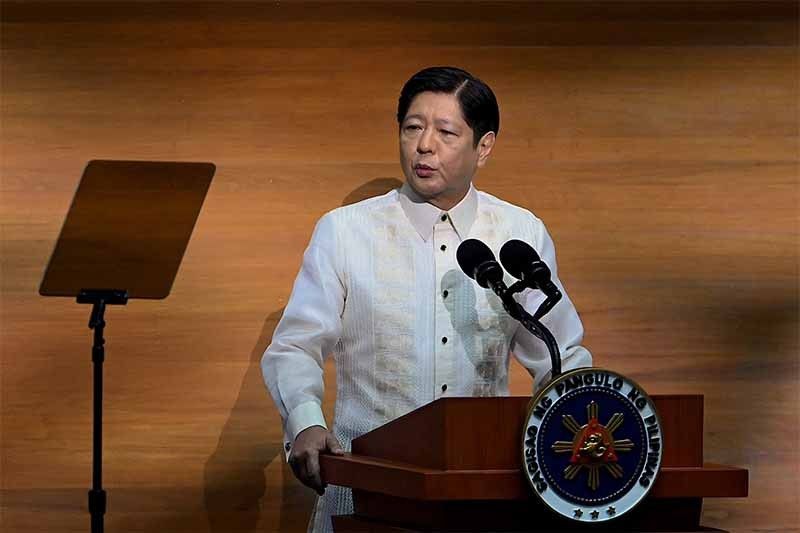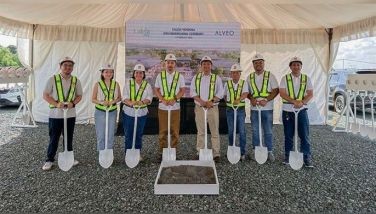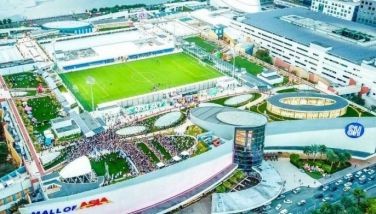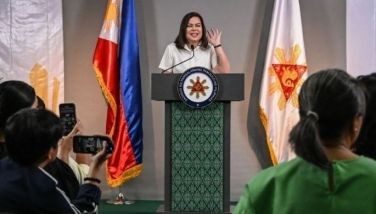What Marcos said in his second SONA

MANILA, Philippines — President Ferdinand "Bongbong" Marcos Jr.'s second State of the Nation Address (SONA) echoed his father, particularly his plans on agriculture, economy and infrastructure. His speech lasted for an hour and 11 minutes, bearing a mix of English and Filipino depending on the subject matter at hand.
Below are the highlights of Marcos' second SONA.
Economy
- The Philippines' Gross Domestic Product (GDP) or growth rate accelerated to 7.6% in 2022 from 5.7% in 2021 – the highest registered since 1976. This, however, went down to 6.4% in the first quarter of 2023, still within the 6 to 7% target of the administration. Growth rates represent the economic expansion of a country.
- The digital economy of the country contributed about P2 trillion, nearly making up a tenth of the GDP.
- Marcos owed this growth to the lifting of pandemic restrictions, the steady flow of remittances, the business process outsourcing (BPO) industry and job generation. "The economy is revived and rejuvenated," he said.
RELATED: In Marcos' second SONA, economic achievements take limelight
Inflation
- The significant drop in the country's inflation rate from 8.7% in January to 5.4% in June was said to stabilize prices of important commodities.
- Bangko Sentral ng Pilipinas (BSP) expects inflation to further ease by the end of the year, projecting a 2.9% inflation rate by 2024.
Investments
- Economic and social services comprise 70% of the national budget, Marcos said as his top priorities are food security, education, health, jobs and social protection.
- The Board of Investments approved P1.2 trillion investment projects for the administration's first year.
- P230 billion for the newly established Green lanes for Strategic Investments that hopes to hasten the process of securing licenses and permits.
- Marcos wants more structural tax reforms.
Revenue generation
- Marcos aspires tax and revenue generation to reach up to 17.3% by 2028.
- Bureau of Internal Revenue - collected P1.05 trillion, a 10% increase from 2022.
- Bureau of Customs - collected P476 billion, a 7.4% increase from 2022.
- Philippine Amusement and Gaming Corporation (PAGCOR) - a 47.9% increase in revenue.
- Philippine Charity Sweepstakes Office (PCSO) - a 20% increase in revenue.
Kadiwa stores
This program was originally introduced by the late dictator Ferdinand Marcos Sr. to lower the prices of agricultural commodities. Just as it was then, the present Kadiwa stores aim to empower farmers with a direct farm-to-consumer food supply chain.
Marcos promises that the Kadiwa stores will not have any additional fees and middlemen. He says that the existing ones have increased the earnings of farmers and lessened the cost for consumers.
1.8 million families were said to have benefited from the 7,000 Kadiwa stores in the Philippines.
The profit of Kadiwa stores has reached about P700 billion and provided employment opportunities for members of over 3,000 cooperatives and organizations.
Marcos envisions making Kadiwa stores permanent, as well as building more across the country.
Fisheries and Agriculture
Marcos said that the methods of the Department of Agriculture, which he chairs, are "more guided by science" in hopes for sustainable production.
The president urged Congress to revisit and amend the Philippine Fisheries Code of 1998 (R.A. No. 8550) with science-based analysis to better determine appropriate fishing areas.
Three hundred farm and fisheries clusters have been determined and are composed of 900 cooperatives and over 200,000 hectares of arable land.
Marcos called for the support of Congress to amend the Philippine Cooperative Code of 2008 to speed up the formation of cooperatives.
New technologies such as Philippine-based bio-fertilizers and balanced fertilizer strategy were said to help farmers reduce costs on fertilizers.
Marcos said the government distributed more than 28,000 new and "quality" machines and equipment for farmers to use.
Fuel and fertilizer discount vouchers were also said to provide relief for farmers amid high prices of the commodities. Marcos said the government distributed fertilizers donated by China.
Geo-Agri map of farm-to-market roads was developed to push for the farm-to-consumer supply chain.
About 4,000 fabrication labs, production and cold storage facilities were built.
Meanwhile, 24 multi-species hatcheries were constructed to increase fish production
Over 70,000 titles of land have been awarded to the beneficiaries of the administration's agrarian reform, Marcos said.
According to Marcos, Executive Order No. 4 implemented the Agrarian Emancipation Act where the total P57 billion debt of 600,000 beneficiaries has been erased.
El Niño
- Marcos said the country will prepare buffer stocks and reserved water supply. Should the need arise, he added, the government will conduct cloud-seeding to induce rain.
- Six thousand rainwater collection systems have also been installed across the country.
RELATED: Marcos details El Niño preparations as he urges public to conserve water
Water
- "Considering its fundamental importance, water security deserves our special focus. Our efforts must not be scattershot, but rather, cohesive, centralized and systematic," Marcos said.
- Created the Water Resources Management Office
- Urged Congress to pass the bill on the creation of a Department of Water Resource Management. It is unclear, however, as to what will be the difference between the two agencies.
- P14.6 billion have been allocated for water supply projects. An example that Marcos provided is the Wawa Bulk Water Supply Project in NCR and Rizal.
Build-Better-More program
- About 83% of the program is to build roads, bridges, seaports, airports and mass transports.
- Infrastructure spending is expected to be at 5 to 6% of the country's GDP.
- Travel time from Ilocos to Bicol will be reduced to just 9 hours from 20 hours with the Luzon Spine Expressway Network Program.
- Twelve bridges will be constructed for the Mega-Bridge program that aims to connect islands and areas separated by waters. Among the bridges included will link the following lands: Bataan-Cavite, Panay-Guimaras-Negros and Samal-Davao City.
- Over 4,000 km of roads and 500 bridges have been constructed, maintained and upgraded as of June 2023, Marcos said.
- Cebu Pier 88 smart port, Clark Airport and Calapan Port have new passenger terminal buildings.
- Marcos said that the North-South Commuter Railway System is already fully operating. This is part of his railway project covering over 1,000 km.
- Marcos wants to use the Maharlika Investment Fund (MIF) to partially fund the Build-Better-More program. "In pooling a small fraction of the considerable but underutilized government funds, the MIF shall be used to make high-impact and profitable investments, such as the Build-Better-More program," he said.
Energy
- Eight new additional power plants have been built, increasing energy production by 1,174 megawatts.
- Marcos said 500,000 homes were provided with electricity. He claims that a 100% electrification of households is "within our reach."
- There are 299 active solar projects, 187 wind projects, 436 hydroelectric projects, 58 biomass projects, 36 geothermal projects and 9 ocean-powered projects.
- Marcos claims the Malampaya project has benefited the country, providing 20% energy for Luzon.
- To push for more gas exploration in the country for energy sources.
- The Unified National Grid is said to "enable more efficient transfers and competitive pricing" of electricity. Sixty-eight projects under this program, however, is "much delayed."
Employment
- Marcos said there are sufficient funds to train those without a livelihood.
- The government's Social Pension for Indigent Senior Citizens, Social Equity, Cash-for-Work for persons with disabilities and Integrated Livelihood Program-Kabuhayan for small businesses are among the programs Marcos lauded. No relevant figures or findings on these programs were mentioned in the report.
- Increased employment rate to 95.7% as of May 2023.
- Marcos wants to "nurture the growth" of services from the Information Technology-Business Process Management and tourism industries.
RELATED: Marcos boasts increase in employment rate but job quality issues remain
Military and Uniformed Personnel (MUP) Pension
"Efforts are underway to make it fully functional and financially sustainable," Marcos said.
He added that the pension reforms will have no impact on MUP. According to the proposed bill, the pension of retirees is tied to that of an active personnel of the same rank. Should the latter experience an increase in salary, so will the retired personnel.
Marcos did not elaborate on specific plans for the MUP pension.
RELATED: Military pension, Department of Water among priority bills in SONA 2023
Education
- Nine in ten newly created teaching positions have been filled and more administrative personnel have been hired.
- Adopt blended learning permanently.
- Build more classrooms and facilities, including climate-ready schools.
- Recalibrate the K to 10 curriculum to strengthen literacy and numeracy skills.
- More higher educational institutions have been included in the World University Rankings in 2023.
- Nearly 50% of the 4.1 million enrolled college students benefit from the Universal Access to Quality Tertiary Education program for free tuition.
- Science and technology-related scholarships are made available from high school all the way to graduate school, Marcos said.
RELATED: Climate-ready schools among Marcos' priorities, still needs Congress to align
Science and Technology
- Forty-four Filipino scientists have returned to the Philippines under the Balik-Scientist Program to produce research in various fields.
- Two additional satellites have been launched into space for meteorological, geological, risk and security assessments.
- Improved maritime education
- Expanding medical and nursing education programs
RELATED: Among achievements in 2023 SONA: Upskilling of seafarers, scientists coming home
Healthcare
- The Food Stamp Program was launched. This will provide beneficiaries who are "food poor" with P3,000 worth of food credits in the latter half of 2023.
- "As of this year, more than 80% of our eligible children have been vaccinated against measles, rubella, and polio," Marcos said.
- Marcos mentioned the "alarming rise" of tuberculosis and human immunodeficiency virus (HIV), a first in all Philippine SONAs.
- Sixty specialty centers opened to the public in 2022, while 3,400 projects to construct more public health facilities were completed.
- Marcos claimed that prices of essential medications have decreased by about 40%.
- The Philippine Health Insurance Corporation's Konsulta Package has increased the number of free dialysis sessions to 156 from 90 in 2022.
- Marcos only mentioned that the government is working on addressing the shortage of nurses and doctors. He did not lay down any concrete plan.
RELATED: Marcos vows release of pending emergency allowances, benefits for health workers
Foreign relations
- Marcos touted the total estimated investments from his "economic missions" abroad, which amounts to US$71 billion or P3.9 trillion investment. It was said to have the potential to generate 175,000 jobs.
RELATED: Marcos parades pledges from foreign trips in 2nd SONA
Tourism
- For the first half of 2023, the country has received three million international visitors.
RELATED: Marcos banks on ‘revenge travel’ for ‘great rebound’ of Philippine tourism
Digitalization
- About 42% of total retail payments were made digitally in 2022.
- E-Government Philippines (eGov PH), the government's super app, was launched to integrate all key government services in one mobile app. The Department of Migrant Workers (DMW) also launched its own DMW Mobile for Overseas Filipino Workers (OFWs)
- Internet speed was said to have improved, with the country ranked 83 out of 142 countries, eight places higher than in 2022.
- Marcos urged the Department of Information Communications Technology (DICT) to establish the National Government Portal and Philippine Business Databank alongside the eGov PH app.
OFWs
- OFWs contributed US$32.5 billion or P1.8 trillion pesos through remittances in 2022.
- Seventy thousand OFWs were deployed to Saudi Arabia for employment.
- The unpaid salaries of 14,000 OFWs who worked in Saudi Arabia during the COVID-19 pandemic are currently being processed.
Housing
- Over 100,000 availed of a housing loan from Pag-IBIG amounting to P117 billion in total.
- Over 148,000 houses and 30,000 certificates of eligibility for lot award have been distributed across the country.
- The government launched the Pambansang Pabahay Para sa Pilipino Housing Program (4PH)
Climate change
- Marcos said that the Philippines is sometimes "over-prepared" for natural hazards and calamities.
- More evacuation centers are to be built, 55 have already been completed.
- Marcos only mentions reducing carbon footprint and protecting forests, with no concrete plans included.
Government
- Marcos called on Congress to enact a new Government Procurement Law and a new Government Auditing Code.
- Marcos said, "almost all of the required Devolution Transition Plans" of the local government units are complete.
RELATED: Marcos orders new procurement, auditing laws
Marawi
- "Former adversaries are now partners in peace," Marcos said.
- Marcos said the rehabilitation of Marawi City is in the phase of providing financial support for victims of the Marawi siege.
Illegal drugs
- The government will follow a community-based treatment, rehabilitation, education and reintegration.
- An additional 102 Balay Silangan Reformation Centers have been established. — intern, Dominique Nicole Flores
- Latest
- Trending




























